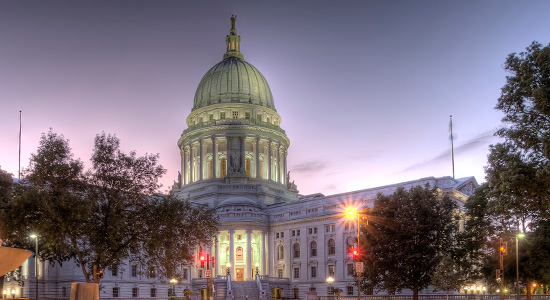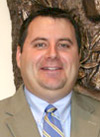
Feb. 15, 2017 – Governor Scott Walker on Feb. 8 unveiled the details of his 2017-19 biennial budget proposal, which contains $76 billion in spending over the next two years. Even before the governor delivered his budget address, legislative leaders indicated they may go further than the governor with bold reforms of existing programs.
New revenue projections last month will assist the governor and the legislature in addressing funding needs, but long-term solutions to road funding and medical assistance funding will be hotly debated. The budget process could get more interesting if action is taken by the federal government on issues like the Affordable Care Act, infrastructure funding, or tax reform. Any of those issues will trickle down to the state level, creating uncertainty on funding or how programs will be structured. Depending on the timing of congressional action, it could either delay portions of the budget or it could require the legislature to come back into session to make changes in the fall.
As the process unfolds, this article addresses proposed budget items that impact lawyers, judges, and the courts, including items the State Bar of Wisconsin and/or its sections have actively monitored or pursued in recent years.
Pay Progression for ADAs and Judicial Pay Raise
After years of lobbying, a new pay progression system was approved for Assistant District Attorneys (ADAs) and State Public Defenders (SPDs) in 2013. The pay progression system is used to reward and retain high quality prosecutors and public defenders that were leaving their respective offices to find higher pay elsewhere.
 Cale Battles, is a government relations coordinator with the State Bar of Wisconsin. He can be reached by email, or by phone at (608) 250-6077.
Cale Battles, is a government relations coordinator with the State Bar of Wisconsin. He can be reached by email, or by phone at (608) 250-6077.
Funding to maintain the pay progression system was removed in the 2015-17 budget. After considerable outreach by district attorneys and Attorney General Brad Schimel, the governor’s upcoming budget adds $1 million in the first year and $2.6 million in the second year of funding for pay progression for ADAs.
The State Public Defenders’ office will see a much smaller increase of $66,400 in the second year of the budget. State Bar President Fran Deisinger recently wrote a letter to the governor to request funding for the program, and the State Bar will continue to strongly advocate to maintain proposed funding in the budget.
The governor also laid the groundwork for judicial pay increases. Wisconsin Supreme Court Chief Justice Pat Roggensack has been strongly advocating for increases in judicial salaries, which have fallen to 41st as compared to other states.
The budget calls for the Director of State Courts to develop and submit a pay plan directly to the Joint Committee on Employee Relations for approval.
Block Grant Funding for State Public Defender Office, Private Bar Rate
During the 2015-17 budget, the governor proposed and the legislature approved a new block grant funding structure for the state court’s office. For the 2017-19 budget, this block grant budget structure has been extended into the State Public Defender’s Office.
More research and information still needs to be gathered on this change and current funding practices, but if the legislature chooses to accept the new funding system, it would provide the Public Defender’s Office with increased budget autonomy.
Along with the new autonomy, the governor also included language in the budget that allows the Public Defender Board more flexibility to create new positions to balance caseloads between in-house counsel and private bar attorneys.
The private bar reimbursement rate continues to be the lowest reimbursement rate of any state in the country. The $40-per-hour rate has not been changed since 1995, while overhead costs for attorneys that take private bar appointments continue to rise. The governor did include an increase in the private bar appropriation that will make sure money will be available to pay private bar attorneys for their work.
Judicial Council Elimination Revived, Judicial Commission Under Supreme Court
Governor Walker’s proposed budget will once again include language to transfer the funding and position authority of the Wisconsin Judicial Commission to the supreme court, and to de-fund the Wisconsin Judicial Council.
Both proposals were included in the governor’s budget proposal in 2015. The role of the Judicial Commission is to investigate and dispose of complaints of judicial misconduct. Since 1978, the Judicial Commission has acted as a separate agency, independent of the court. With the transfer of funding and positions, the governor’s proposal would remove the agency’s independence; it would now be contained within the supreme court. It’s unclear how this change will affect operation of the Judicial Commission. Currently, the Commission has investigative authority over 500 current sitting judges, including supreme court justices and judges on the court of appeals, circuit courts, and municipal courts.
The Judicial Council’s fate is murkier. The budget proposal calls for a complete elimination of all funding and statutory references to the council. Governor Walker indicated in his proposal that the court has the authority to create and support an advisory council if it so chooses. The Judicial Council has worked on a number of substantial legislative and court initiatives over the years.
Other Budget Items, Including $1 Million for Civil Legal Needs
The state budget is a wide ranging document with hundreds of items of public policy. A number of State Bar practice sections and members will be reviewing items over the course of the next few weeks. The almost 1,000-page bill is the framework for how the state government will operate over the next two years. Below is a summary of a few additional items of interest in the governor’s proposal.
Included or created in the budget:
-
$1 million ($500,000 in each year of the biennium) of funding for civil legal services out of the Temporary Assistance for Needy Families (TANF) block grant;
-
$2 million in each year of the biennium for treatment alternatives and diversion programs;
-
A plan to establish a pilot project to create a specialized business court program for commercial disputes, which mirrors court petition 16-05.
Not included, approved, or eliminated in the budget:
-
The Parole Commission is eliminated and all duties are transferred to the Director of Parole in the Department of Corrections;
-
The governor did not approve the Department of Justice’s proposal for the state to cover State Bar dues for agency attorneys;
-
The budget eliminates the requirement that stenographic/court reporters record testimony at worker’s compensation hearings;
-
The governor did not include the Public Defender’s plan to provide tuition reimbursement for attorneys willing to relocate to rural areas.
What Happens Next in the Budget Process?
The budget will now be the focus of the legislature for the next four months. The Joint Finance Committee will hold agency budget briefings in late February and early March, with statewide public hearings to follow. Voting on individual provisions will begin in early April, with final committee votes taking place before Memorial Day.
The legislature will then debate and vote on the proposal in late May or June. It is anticipated that all budget votes will be completed by mid-June, with the governor signing the budget bill before July 1, 2017, when the new fiscal year begins.
